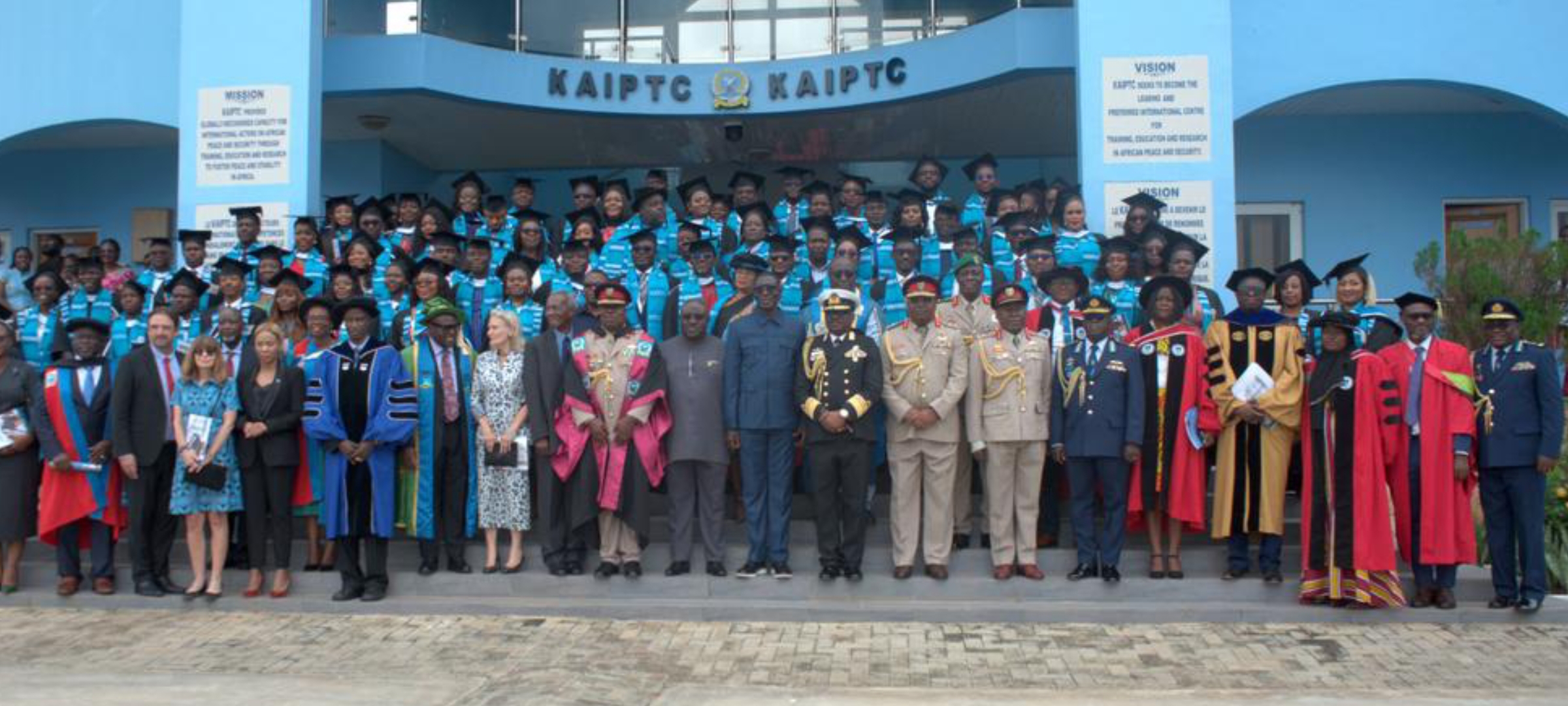A joint graduation ceremony has been held by the Kofi Annan International Peacekeeping Training Centre (KAIPTC) for seventy-one (71) graduands who have completed a year’s study on Masters of Arts (MA) in Conflict, Peace and Security, and MA in Gender, Peace and Security, with three (3) in Doctorate of Philosophy in International Conflict Management.

The function, held on Wednesday 7 June 2023 at the KAIPTC, Teshie, Ghana, was the Economic Community of West African States’ (ECOWAS) Training Centre of Excellence’s (TCE) 11th joint graduation, and was under the theme ‘Centering African Peace and Security Thought in a Multipolar World’, and had students from Burkina Faso, Cameroon, La Côte d’Ivoire, Ghana, Mali and Nigeria.
In his welcome address, particularly to the graduates, the Commandant, KAIPTC – Major General (Maj Gen) Richard Addo Gyane charged them to keep in mind that present challenges call for creativity, innovation, resourcefulness and the courage to impact the environment with the wealth of knowledge acquired, and to say goodbye to the narrative that continues to classify Africans as third-rate occupants of planet Earth.
He said a major objective of the KAIPTC academic enterprise has been to build a critical mass of scholars or an epistemic community that helps to center African peace and security thought in the emerging multipolar world, and that since the commencement of the postgraduate programme in 2011, the TCE has remained committed to building a world-class institution of higher learning that projects KAIPTC as the leading provider of tertiary education and training in the African peace and security space.

General Gyane said the KAIPTC has successfully positioned itself in the state of being one of the few African institutions continually called upon by the United Nations, the African Union, ECOWAS and state governments across the continent of Africa, to offer specialised training briefs and policy support in the issue-areas of peace and security.
He said, on the continental front of peace and security, the post-colonial African state, which emerged as a product of international action, remains largely poor, weak and subordinate in lopsided power relations that continue to reproduce and reinforce structural inequalities within the frameworks of the current global political-economy. He proffered that effective strategic planning and implementation is a key contributor to the necessary paradigm shift that could eventually help change the narrative.
He said African states and societies are often impacted disproportionately by systemic trends such as globalisation and other global economic and political shocks, and that while countries continue to interact with the rest of the world, the making of critical decisions that condition the choices and options open to them, has been dominated by governments of the global North and powerful international institutions.

He added that globalization has facilitated increased connectivity and interdependence among countries and regions of the world, and although this interconnectedness has expanded trade and investment globally, its effects have been unbalanced and less positive for the majority of African countries; which could be linked to the unequal nature of the integration that opens up African economies within the competitive context of free market capitalism.
The Army General asserted that the roots of these lopsided relations can be traced to the historical context of extraction, which saw African states divided and balkanized with lingering effects that continue to weaken the capacity of states to assure security within their territories and act collectively and effectively, while engaging the challenges and opportunities of globalization.

The Guest Speaker for the ceremony – Professor Samuel Ato Duncan, who is the President General of Centre of Awareness (COA) Global Peace Mission (GPM), producers of COA Mixture – a plant medicine for general wellbeing, opined forcefully that various factors which deny the world of peace are Religious Extremism, Ethnic Marginalization, Poverty, Hunger, Diseases and Human Rights Violations.
Professor Duncan said the involvement of United Nations (UN) and its affiliate bodies, African Union (AU), ECOWAS, Civil Society Organizations, National Security Establishments and reputable educational institutions like the KAIPTC, indicate that Peace is a priceless commodity and a necessary requirement for the development of any human society.
He called for another look at the root causes of conflicts in Africa, which he asserted that while peacekeeping efforts are essential, they are not enough to achieve long-term stability, therefore, the people must be weaned from patronizing the deceptions of entrepreneurs of conflicts, because entrepreneurs whose businesses thrive on the festering of conflicts and wars, perceive peacebuilding and all its activities as a threat to the survival of their business interests.

African perspectives should inform both research and policy formulation with a focus on long-term solutions, which will require greater investments in training and capacity-building for African policymakers and experts, and a deeper understanding of African societies and cultures, he concluded.
Dignitaries present at the graduation included; Ghana’s Deputy Minister for Defence – Mr Kofi Amankwaa-Manu, Ghana’s Chief of the Defence Staff – Vice Admiral Seth Amoama, Formation Commanders of Ghana Armed Forces, Members of the Diplomatic Corps, Rector of Ghana Institute of Management and Public Administration (GIMPA), and Members of the Executive Management Committee and Academic Board of the KAIPTC.
